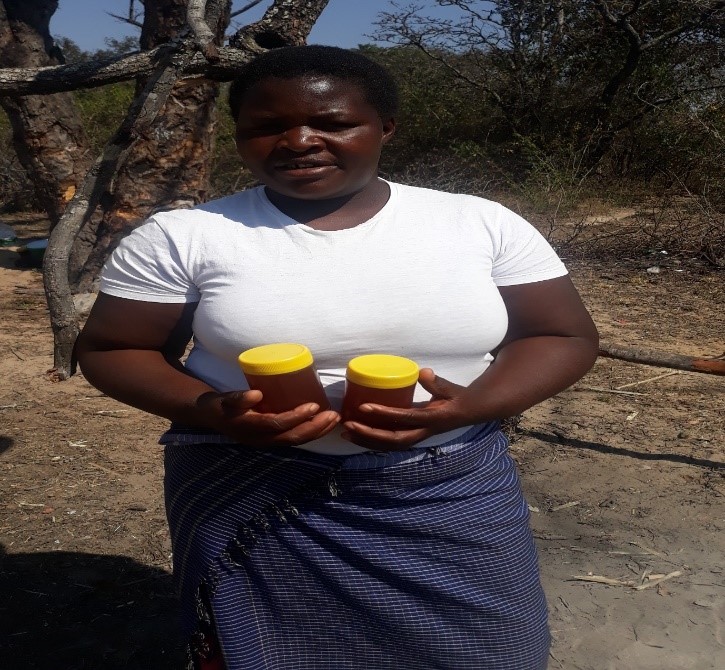Bee farming and keeping in Africa is one sector of agriculture that has great economic and environmental potential in terms of creating sustainable business and employment while protecting the livelihood of bees. Rebecca Chikanya from Chirumanzu district identified this opportunity in 2021 and has since gained financial independence.
The 34-year-old says the business trainings she received from Hand in Hand Zimbabwe helped her to identify the sustainable enterprise.
Rebecca is part of the rural women who have been fortunate enough to go through six-month entrepreneurship training on health, motivation, gender and environmental awareness under the Hand in Hand Zimbabwe Motivated and Entrepreneurial Youth (MEY) project. After the training, the organisation also encouraged her to go through apiculture technical skills training which was conducted in partnership with the Forestry Commission.
“The trainings that l received from Hand in Hand Zimbabwe were an eye opener and they contributed to the development of my enterprise.
“With the help of Module 3 on Opportunity Identification and Enterprise Planning, l was able to carry out market research on the demand of honey. I also received technical skills and I learnt how to craft modern beehives,” she said.
Modernising beekeeping has had a positive impact on attracting women into the sector who were previously discouraged by traditional honey harvesting methods which included climbing trees to get honeycombs.
In 2021 Rebecca borrowed USD$30 from her Self-Help Group and she bought material to build two wooden bee hives. This move helped her to kick start her bee-keeping enterprise.
To date, Rebecca sells her honey at USD$3 for 350ml and on a good month she sells at least 75 bottles of processed honey. She also sells unprocessed honey which costs USD$2. On average Rebecca gets a profit of USD$230 from her sales.
Her bee-keeping enterprise has drastically grown as she now owns 8 kenyan top bar bee hives which she bought from her business earnings.
With the help of Hand in Hand Zimbabwe, Rebecca now understands the importance of record keeping and she ensures that all her expenses and profits are clearly recorded. This has also helped her track the growth of her business.
Rebecca says she is now financially independent and can now take care of her family.
“Before setting up my bee-keeping enterprise, I used to struggle to provide a decent meal for my family and my children were continuously chased out of school due to unpaid school fees.
“Things however changed for the better after I joined Hand in Hand Zimbabwe as I could now provide for my family effortlessly,” she said.
Bee-keeping in Zimbabwe is lucrative as farmers generate a significant income and don’t need large capital or land to enter the business. Not only is honey the income-generating product from bee farming, but also propolis, bee venom and royal jelly, as well as other products. Farmers are trained in making products such as beeswax and cosmetic products from bee products.

